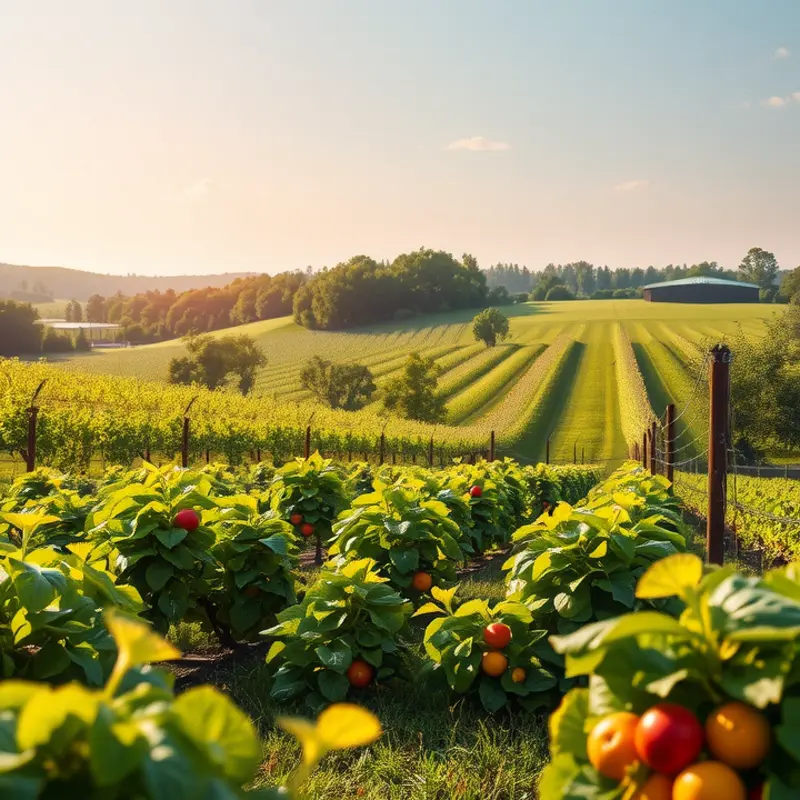Making environmentally-conscious food choices is crucial in protecting our planet. By opting for sustainable eating habits, you can contribute to a healthier ecosystem, reduce your carbon footprint, and support local communities. This guide offers practical advice to harmonize your eating habits with ecological principles, empowering you to make choices that benefit both your health and the environment.
The Power of Plant-Based Diets

Adopting a plant-based diet is a powerful step toward minimizing our environmental footprint. By reducing meat consumption and focusing on fruits, vegetables, and whole grains, we conserve natural resources and reduce greenhouse gas emissions. Livestock farming is resource-intensive, requiring significant amounts of land, water, and feed. By choosing plant-based foods, we directly impact these resource allocations, as plants generally require less water and land than animals.
Embracing a plant-based diet benefits the environment in several ways. It reduces methane emissions, a potent greenhouse gas, from livestock. Crop production for plant-based foods results in lower carbon outputs compared to meat production. Furthermore, deforestation for pastureland clears vital carbon sinks—switching to a diet centered on plants helps preserve these essential ecosystems.
Integrating more plant-based meals into your routine can be straightforward and enjoyable. Start by incorporating meatless Mondays or similar initiatives to break the habit gently. Use versatile ingredients like beans, lentils, and tofu to mimic meat textures in your favorite dishes. Explore global cuisines rich in vegetarian recipes, offering both variety and nutritional depth. For guidance on minimal preparation meal ideas, visit the minimal prep dinner ideas page for actionable insights.
Exploring plant-based eating also enriches our palates with diverse flavors and textures. Whole grains, such as quinoa and bulgur, combined with seasonal vegetables, provide nutritious and fulfilling meals. Encouragingly, these foods naturally contain fiber, essential vitamins, and antioxidants, supporting overall health.
The global food system experiences positive shifts with increased plant-based consumption. Reduced demand for meat results in lowered industrial animal farming, decreasing pressure on land use and reducing pollution. With more people opting for plant-based diets, it can catalyze broader agricultural changes, promoting sustainable crop production and fostering biodiversity.
Adopting plant-based diets contributes significantly to sustainable living. Each meal choice aligns with ecological values, making a cumulative impact. As more individuals transition towards these diets, the pressure on global food systems lessens, creating ripples of change that extend well beyond our plates.
Support Local and Seasonal Produce

Opting for local and seasonal produce is more than a trend; it’s a way to align our eating habits with ecological balance. By choosing food grown nearby, we curtail the carbon footprint associated with long-distance transportation. This reduction in transportation emissions means fewer greenhouse gases and less pollution, contributing positively to our planet’s health.
Supporting local farmers also helps sustain agricultural communities. Farmers often struggle against large industrial competitors, but consumer support can tip the scales. Local purchasing keeps revenue within the community, fostering economic resilience and encouraging more sustainable agricultural practices. You’ll be contributing to a system where producers are incentivized to care for the land that sustains them.
Moreover, local food tends to be fresher and more nutritious. Produce picked at its peak retains more vitamins and minerals, offering superior taste and health benefits. Seasonal eating can elevate your meals with vibrant, flavorful ingredients. For example, incorporating fresh summer tomatoes into salads or winter squash into soups transforms ordinary dishes into extraordinary ones.
Finding sustainable produce may seem daunting, but there are several accessible methods. Farmers’ markets are excellent places to start. Here, you can directly interact with growers, learning about their farming methods and crop seasons. Community-supported agriculture (CSA) programs offer another path, allowing you to subscribe for seasonal shares of produce, supporting farmers directly.
Local food co-ops also offer a curated selection of regional products, often including descriptions of how each item’s production processes minimize ecological impact. Even grocery stores are stepping up, with sections dedicated to local and seasonal foods.
To seamlessly incorporate these ingredients into your meals, begin by planning recipes around available produce. Seasonal cookbooks or online resources specifically designed for your region can be invaluable. You can also explore minimal prep dinner ideas that focus on using fresh, local ingredients.
Engaging with seasonal produce isn’t merely a culinary choice—it’s a commitment to environmental stewardship. As you nurture these habits, you’ll find a deeper connection not only to the land but to the community around you. Your table will reflect the rhythm of nature, offering nourishment that’s both delicious and responsible.
Final words
Embracing ecological harmony through our eating choices can have a far-reaching impact. The shift towards plant-based diets and prioritizing local, seasonal produce not only benefits personal health but also contributes significantly to environmental sustainability. By making informed choices and supporting local agriculture, every meal becomes an opportunity to care for our planet. Take the time to explore your local food options, experiment with plant-based recipes, and encourage others to join in this vital movement. Together, we can cultivate a harmonious relationship with our environment through the food we choose.








